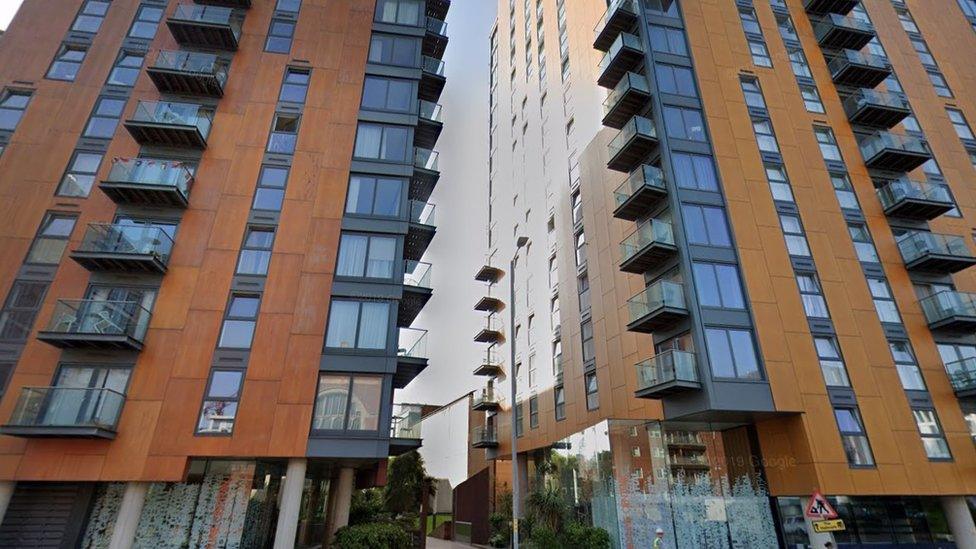Dangerous tower blocks should be taken over by government - MPs
- Published

People living at Skyline Central 1 tower block (left) in Manchester said they were given no option but to take out "life-changing" loans
MPs have urged the government to take over residential tower blocks if owners fail to remove dangerous cladding.
The housing committee says it's "deeply shocking and completely unacceptable" that about 2,000 buildings in England are still potentially at risk nearly three years after the Grenfell fire.
The committee wants the work finished by December 2021 but says the budget is only a third of what is needed.
The government said it was providing £1.6bn to remove dangerous cladding.
A spokesperson added that ministers were bringing in the biggest legislative changes in a generation to ensure residents' safety.
According to the latest official figures 246 buildings still had Aluminium Composite Material cladding, the type which fuelled the Grenfell fire.
However, there are also concerns about an estimated 1,700 buildings with other dangerous materials, including high pressure laminate boards which are made from paper and resin.
The government is trying to offer funding to ensure the materials are removed, because some freeholders, who own the buildings have taken no action to make their properties safe.
'Life-changing bills'
However, the report by the Commons Housing, Communities and Local Government Select Committee finds that while the owners do have a legal duty to ensure the work is done, they usually do not have a duty to pay for it, "regardless of how we feel about the morality of the situation".
As a result, leaseholder residents living in the buildings are facing "life-changing" bills.
MPs say that if the owners will not act, the government should buy the buildings, do the work, and hand them over to their residents to run.
They want a national body to oversee the process.
"Any residential building where works have not commenced by December 2020 should be subject to a compulsory purchase order," the MPs propose.
"The national body would step in where overburdened local authorities are unable or unwilling to act.
"Once remediated, buildings should be converted to commonhold and returned to leaseholders," the MPs argue.
By their calculation, the government fund will only pay for a third of the work needed and more funding will be required.
"The government is clearly trying to find ways to fit a £3bn liability into a £1bn funding pot," the report says.
But the Ministry of Housing, Communities and Local Government said its fund now stands at £1.6bn and ministers do not expect public money to be the only means of making buildings safe, with owners expected to pay a "significant proportion".
Some residents say they have been "utterly broken" by the crisis, according to a survey published on Thursday by the UK Cladding Action Group., external
Some have been forced to take huge loans to pay thousands of pounds towards repairs or for bigger insurance premiums and service charges.
Others are in buildings not eligible for funding.
The uncertainty has meant many owners cannot sell their flats, causing big problems for young families.
They are also aware they are living in blocks which could pose a major fire hazard, with "Waking Watch" patrols introduced to warn of fires, sometimes funded by residents.
Of 550 leaseholders who responded to the survey: :
an overwhelming 90% said their mental health had deteriorated
a quarter had taken time off work
more than half - 55% - described their situation as "hopeless"
71% were "depressed"
The group says leaseholders had bought properties in good faith and had no idea the buildings posed a fire risk.